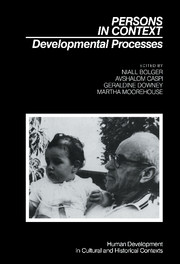Book contents
- Frontmatter
- Contents
- Preface
- Contributors
- 1 Development in context: research perspectives
- 2 Interacting systems in human development Research
- 3 Children, families, and communities: ways of viewing their relationships to each other
- 4 Human development and social change: an emerging perspective on the life course
- 5 Family process: loops, levels, and linkages
- 6 On the constructive role of problem behavior in adolescence
- 7 The sociogenesis of self concepts
- 8 Putting persons back into the context
- 9 How genotypes and environments combine: development and individual differences
- Author index
- Subject index
4 - Human development and social change: an emerging perspective on the life course
Published online by Cambridge University Press: 04 May 2010
- Frontmatter
- Contents
- Preface
- Contributors
- 1 Development in context: research perspectives
- 2 Interacting systems in human development Research
- 3 Children, families, and communities: ways of viewing their relationships to each other
- 4 Human development and social change: an emerging perspective on the life course
- 5 Family process: loops, levels, and linkages
- 6 On the constructive role of problem behavior in adolescence
- 7 The sociogenesis of self concepts
- 8 Putting persons back into the context
- 9 How genotypes and environments combine: development and individual differences
- Author index
- Subject index
Summary
Epochs of rapid and drastic change repeatedly draw attention to important issues in the study of human development. These are the times that generate problems of human dislocation and deprivation, as illustrated most recently by the mass immigration of the 20th century and the turmoil of the 1960s. They also force us to recognize that any serious study of human development must consider time, process, and context. Periods of rapid change call for temporal perspectives on individuals, families, and environments.
These concerns are at the base of our longitudinal research on human development in a changing society. The central hypothesis relates social changes in the Great Depression and Second World War to individual and family development. We therefore ask the following questions: What are the connections between social change and life patterns? What are the processes by which these effects are expressed and persist across time and place? And how do individuals surmount the limitations of a deprived childhood and manage to turn around their fortunes and lives?
The life-course perspective (Elder, 1975, 1978a, 1978b, 1984, 1985) has become one way of bringing all of these elements together in a programmatic study. The life-course perspective is temporal and contextual in the sense that it locates people and family members in history through birth years and in the life course through the social meaning of age (i.e., age-graded events and social roles).
- Type
- Chapter
- Information
- Persons in ContextDevelopmental Processes, pp. 77 - 113Publisher: Cambridge University PressPrint publication year: 1989
- 4
- Cited by

